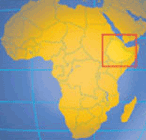|
|
|
|
|
|
Ethiopians in
Canada
According to the Canadian census, there were, in 1996, 14,955 individuals of Ethiopian ethnicity in Canada (13,010 single response and 1,950 multiple response). There were no official statistics or separate categories for people who rejected identification as Ethiopians. (Canadian census data reported the presence of 6,225 individuals from the independent state of Eritrea.) Ethiopians have tended to concentrate in Canada's urban centers, particularly within Toronto and its environs, because they have been more likely to find employment in a large urban setting. A small group of Ethiopian Jews (Falashas) made their way to Montreal where they struck up a good relationship with that city's Jewish community. The occupational transition that has been difficult for many has resulted in a dramatic decline in their socio-economic status. This downward mobility can be attributed in part to the language barrier: it was all but impossible for Ethiopians in Canada to find other than low skilled, manual, or service sector work until they became proficient in English. Another problem was that the training and experience acquired by individuals in Ethiopia tended to go unrecognized in Canada. Some Ethiopians responded to the obstacle of obtaining professional or skilled work by establishing businesses. A clustering of Ethiopian restaurants around Bloor and Christie Streets has helped create the ambiance of an Ethiopian immigrant neighborhood. Ethiopians also found that they could make a living in auto repair, furniture manufacturing, and commercial and instant printing services. Although Ethiopian quest for decent housing and steady employment has been a preoccupation, various ethnocultural associations have helped to maintain local identities and to foster a larger sense of fellow feeling and cooperation. Eritreans, Amharas, Oromos, and Tigrayans have challenged themselves by working together to create a valuable and formidable complementary counterweight to the efforts of the Ethiopian government to deliver humanitarian aid to needy people at home. Ethiopians in Canada have also emerged as professionals in finance, engineering, and particularly in medicine. The Ethiopian Orthodox Church in Toronto also played an important role. The Orthodox Church and even the Ethiopian Evangelical Church have helped Ethiopian Christians achieve a greater sense of nationality. Also, Ethiopian Muslims have found companionship and strength in many of Toronto's mosques.
ETHIOPIA TO CANADA Every year, thousands of people from other countries come to Canada to begin a new life. They bring many talents and skills and the hope of contributing to their new society. You may be reading this profile because you are a volunteer in an organized HOST program, or simply because your work or daily life has brought you into contact with newly arrived Ethiopians. Whatever your source of interest, this profile will help you understand something about Ethiopia and the people who live there.
Migration is a new experience for Ethiopians. Traditionally they did not move abroad permanently or change their citizenship. The 1974 revolution and the years of chaos that followed sparked migration. Today, dire poverty and underdevelopment in Ethiopia continue to compel many people to leave their country. Currently, there are more than 15,000 Ethiopians in Canada.
Ethiopians coming to Canada will have many of the same questions that you would have if you moved to a new city or country. They will wonder how to find a job, which schools their children should attend, how to find a doctor and what their new community will be like. You can help your new friends settle by answering their questions. You will also find that you have much to learn from them.
Although this cultural profile provides insights into some customs, it does not cover all facets of life. The customs described may not apply in equal measure to all newcomers from Ethiopia. Summary Fact Sheet
Official Name Federal Democratic Republic of Ethiopia Capital City Addis Ababa Type of Government Democratic Republic Population 60 million Area 1,251,282 sq. km Major Ethnic Groups mhara, Tigrinya, Oromo, Afar, Somali, Omo and others Languages Amharic (official), Tigrinya, Oromo, and others Religions Ethiopian Orthodox Tewahedo Christianity, Islam, Judaism, traditional indigenous beliefs Unit of Currency Birr National Flag Three horizontal stripes of green, yellow and red (top to bottom). At the center is the country's coat of arms: a yellow star on a round, blue background. Date of Independence Never colonized
Did you know? The name Ethiopia come from a Greek word meaning "sunburned faces." The Greeks called all peoples south of Egypt Ethiopians because of their darker skin. Ethiopia's former name is Abyssinia, a word of uncertain origin: some people believe it comes from an Arabic word meaning "mixed" - a reference to the country's many ethnic groups; others contend that the name belonged to an early Ethiopian tribe.
*The Ethiopian Embassy in Canada is also accredited to the countries of Mexico & Cuba
Ambassador of Ethiopia to Canada :HIS EXCELLENCY Dr. Berhanu Dibaba
Embassy Diplomats: Mr. Tebege Berhe - Counselor Mrs. Yeharerwork Bekele - Attache
Embassy working hours : Monday-Friday 8:30am-4:00pm
The Embassy closes on ALL Canadian Statuary Holidays as well as on All Ethiopian National holidays which are as follows: 12 September - Ethiopian NEW YEAR 28 September - The Finding of the True Cross (Meskel) *25 November - Ramadan (Id Al Fater) 07 January - Ethiopian Christmas *20 January - Ethiopian Epiphany *01 February- Id Al Adha (Arefa) 02 March - Victory of Adwa Commemoration Day *09 April - Ethiopian Good Friday *11 April - Ethiopian Easter 01 May - International Labor Day *02 May - Birth of the Prophet Mohammed (Mawled) 05 May - Ethiopian Patriot's Victory Day 28 May - Overthrow of the Derge Regime A Note of Thanks to All Ethiopians in Canada
As many of you are aware, Ethiopians everywhere have been taking various initiatives from making their individual contributions to organizing fundraising activities to assist their fellow Ethiopians back home who are facing a severe drought. As part of this initiative and in an attempt to help facilitate this endeavor, the Embassy in Canada had opened a special account where Ethiopians in Canada can send their contributions. The Embassy would like to inform that we have transferred $16,700.00 Canadian Dollars ($10,809.76 USD) to the Disaster Prevention and Preparedness Commission (DPPC). This amount was collected from mid December 2002 to the end of January 2003. Prior to this, the staff at the Embassy have also contributed from their salaries a total of $4,516.00 USD which was also donated to the DPPC. In total, Ethiopians in Canada including the Embassy staff have so far donated $15,325.76 USD. We would like to take this opportunity to thank you all for your generous contributions and encourage all Ethiopians in Canada to continue to support their compatriots in their hour of need. Embassy of Ethiopia, OTTAWA P.S. You can send your contributions by : Check or Money Order Payable To : Embassy of
Ethiopia OR Bank Transfer To : Embassy of Ethiopia Bank of Montreal Account Number : 2444-8083-699 112 Kent Street, Ottawa, ON (If you donate by Bank Transfer, please send us a copy of the transfer slip with your name and address, so that we can send you a receipt) |



 ETHIOPIANS
come from the oldest independent country in Africa. Located
in northeast Africa, Ethiopia was formerly known as
Abyssinia. The Ethiopian presence in Canada is a recent
phenomenon dating from the 1980s. Ethiopia's modern history
has been marked by civil war, fighting against guerillas in
the provinces of Eritrea (a separate country since 1992) and
Tigray, and by repeated famines caused by drought. These
factors have forced many to seek refuge abroad. Amharas,
Tigrayans, Oromos, Jews, and others came to Canada from
several countries of first asylum that included Egypt,
Kenya, Italy, and Greece. The first group of newcomers to
Canada was composed primarily of single English-speaking
young men from middle- and upper-class
backgrounds.
ETHIOPIANS
come from the oldest independent country in Africa. Located
in northeast Africa, Ethiopia was formerly known as
Abyssinia. The Ethiopian presence in Canada is a recent
phenomenon dating from the 1980s. Ethiopia's modern history
has been marked by civil war, fighting against guerillas in
the provinces of Eritrea (a separate country since 1992) and
Tigray, and by repeated famines caused by drought. These
factors have forced many to seek refuge abroad. Amharas,
Tigrayans, Oromos, Jews, and others came to Canada from
several countries of first asylum that included Egypt,
Kenya, Italy, and Greece. The first group of newcomers to
Canada was composed primarily of single English-speaking
young men from middle- and upper-class
backgrounds.